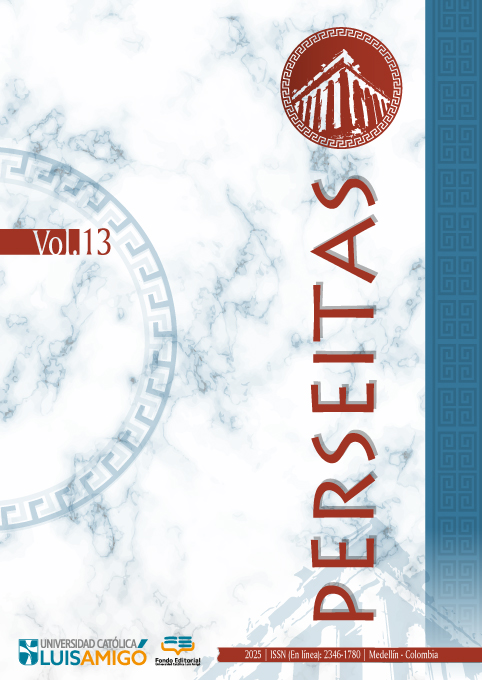The avicennian understanding of the commonness of nature and its influence on John Duns Scotus
DOI:
https://doi.org/10.21501/23461780.5144Keywords:
Avicenna, Duns Escoto, Filosofía Medieval, Metafísica, Metafísica Medieval, Naturaleza Común.Abstract
El concepto de naturaleza común en Duns Escoto es generalmente reconocido por tomar inspiración en el mismo concepto del filósofo Avicenna. Si bien las propuestas de los filósofos con respecto a la naturaleza común son similares, la diferencia entre ellos y los aportes planteados por Escoto pueden no ser muy claros a primera vista. En el presente artículo se examina la profunda influencia de la propuesta de Avicenna en la teoría escotista, también dilucidando los aportes de Escoto y la evolución del concepto de naturaleza común desde la mirada escotista. En el artículo se exploran los interrogantes de ¿es simplemente la teoría de Escoto un reflejo de la propuesta de Avicenna? Y ¿Cuáles son los aportes que introduce Escoto al concepto de naturaleza común que previamente presentó Avicenna? El artículo demostrará que, efectivamente, Escoto añade ideas valiosas al concepto de naturaleza común que inicialmente no se encontraban en la propuesta de Avicenna, lo cual ayuda a crear una distinción más clara entre lo común y lo universal, y servirá eventualmente como las bases para la epistemología realista que propone Escoto y su propuesta con respecto a la comprensión de la realidad y su relación con el conocimiento.
Downloads
References
Aristoteles. (1965). De Interpretatione: De interpretatione vel Periermenias. Translatio Boethii (L. Minio-Paluello, Ed.; G. de Moerbeka, Trans.; G. Verbeke, Rev.; L. Minio-Paluello, Ed.; Aristoteles Latinus II 1-2). Desclée De Brouwer.
Avicenna. (1980) Liber De Philosophia Prima sive Scientia Divina Partes V-X (Avicenna Latinus, S. van Riet (Ed.), Vol. 2). Brill.
Avicenna. (2005). The Metaphysics of The Healing (M. Marmura, Trans.). Brigham Young University Press.
Boethius. (1877). Commentarii in Libri Aristoteles Peri Hermeneias (C. Meiser, Ed.). Teubneri.
Cohen, M., & Reeve, C. D. C. (2021). Aristotle’s Metaphysics. In E. Zalta (Ed.), The Stanford Encyclopedia of Philosophy (Winter 2021 Edition). https://plato.stanford.edu/archives/win2021/entries/aristotle-metaphysics/
De Haan, D. (2020). Necessary Existence and the Doctrine of Being in Avicenna’s Metaphysics of the Healing (Investigating Medieval Philosophy Vol. 15). Brill.
Emilsson, E. (2022). Porphyry. In E. Zalta (Ed.), The Stanford Encyclopedia of Philosophy (Spring 2022 Edition). https://plato.stanford.edu/archives/spr2022/entries/porphyry/
Galluzzo, G. (2011). Two Senses of ’Common’. Avicenna’s doctrine of essence and Aquinas’s view on individuation. In D. N. Hasse & A. Bertolacci (Eds.), The Arabic, Hebrew and Latin Reception of Avicenna’s Metaphysics (Scientia Greco-Arabica Vol. 7, pp. 309-337). De Gruyter.
González-Ayesta, C., & González-Ginocchio, D. (2015). Logic, ontology and the psychology of universals in Duns Scotus. In G. Klima & A. W. Hall (Eds.), Maimonides on God and Duns Scotus on Logic and Metaphysics (Proceedings of the Society of Medieval Logic and Metaphysics, Vol. 12, pp. 101-131). Cambridge Scholars Publishing.
Janos, D. (2020). Avicenna on the Ontology of Pure Quiddity (Scientia Greco-Arabica, Vol. 26). De Gruyter.
Jaramillo, M. J. (2017). The metaphysical concept of nature by John Duns Scotus and its epistemological implications. Forum. Supplement to Acta Philosophica, 3, 415-432. https://doi.org/10.17421/2498-9746-03-25
King, P. (1992). Duns Scotus on the common nature and the individual differentia. Philosophical Topics, 20(2), 51-76. https://www.jstor.org/stable/43154129
Klima, G. (2022). The medieval problem of universals. In E. Zalta (Ed.), The Stanford Encyclopedia of Philosophy (Spring 2022 Edition). https://plato.stanford.edu/archives/spr2022/entries/universals-medieval/
Kobusch, T. (1987). Sein und Sprache: Historische Grundlegung einer Ontologie der Sprache. Brill.
Libera, A. (1996). La Querelle des Universaux : De Platon à la fin du Moyen Age. Éditions du Seuil.
Marenbon, J. (2021). Anicius Manlius Severinus Boethius. In E. Zalta (Ed.), The Stanford Encyclopedia of Philosophy (Winter 2021 Edition). https://plato.stanford.edu/archives/win2021/entries/boethius/
Marmura, M. (1992). Quiddity and universality in Avicenna. In P. Morewedge (Ed.), Neoplatonism and Islamic Thought (Studies in Neoplatonism: Ancient and Modern Vol. 5, pp. 77-88). State University of New York Press.
Owens, J. (1957). Common nature: A point of comparison between Thomistic and Scotistic metaphysics. Medieval Studies, 19, 1-14. https://doi.org/10.1484/J.MS.2.306612
Pérez-Estévez, A. (2006). Entendimiento y universalidad en Duns Escoto. In Pacheco, M. C. & Meirinhos. J. F. (Eds.), Intellect et imagination dans la Philosophie Médiévale / Intellect and imagination in Medieval Philosophy / Intelecto e imaginaçao na Filosofia Medieval (Actes du XIe Congrès International de Philosophie Médiévale de la Société Internationale pour l’Étude de la Philosophie Médiévale, S.I.E.P.M., Porto, du 26 au 31 août 2002, Vol. 11, pp. 1507-1521). Brepols.
Pini, G. (2011). Scotus and Avicenna on what it is to be a thing. In D. N. Hasse & A. Bertolacci (Eds.), The Arabic, Hebrew and Latin Reception of Avicenna’s Metaphysics (Scientia Greco-Arabica Vol. 7, pp. 365-387). De Gruyter.
Porphyry. (1887). Isagoge, (A. Busse, Ed.; Commentaria in Aristotelem Greca Vol. 4/1). De Gruyter.
Regis, E. (1976). Aristotle on universals. The Thomist: A Speculative Quarterly Review, 40(1), 135-152. https://doi.org/10.1353/tho.1976.0042
Scotus, D. (1973). Ordinatio, Liber II, Distinctiones 1-3; (C. Balić et al., Eds.; Opera Omnia, Vol. 7). Typis Polyglottis Vaticanis. https://www.logicmuseum.com/wiki/Authors/Duns_Scotus/Ordinatio/Ordinatio_II/D3/P1Q1#cite_note-5
Scotus, D. (1997). Quaestiones super libros Metaphysicorum Aristotelis, Libri VI–IX; (G. Etzkorn et al., Eds.; Opera Philosophica, Vol. 4). The Franciscan Institute.
Studtmann, P. (2021). Aristotle’s categories. In E. Zalta (Ed.), The Stanford Encyclopedia of Philosophy (Winter 2021 Edition). https://plato.stanford.edu/entries/aristotle-categories/
Sykes, R. D. (1975). Form in Aristotle: Universal or particular? Philosophy, 50(193), 311-331. https://www.jstor.org/stable/3749857
Wisnovsky, R. (2005). Avicenna and the Avicennian tradition. In P. Adamson & R. Taylor (Eds.), The Cambridge Companion to Arabic Philosophy (pp. 92–136). Cambridge University Press.
Wisnovsky, R. (2011). Essence and existence in the eleventh- and twelfth-century Islamic East (Mašriq): A Sketch, in: Hasse, D. N.; Bertolacci, A. (Ed.), The Arabic, Hebrew and Latin Reception of Avicenna’s Metaphysics (Scientia Greco-Arabica Vol. 7, pp. 27‒50). De Gruyter.
Wisnovsky, R. (2013). Avicenna’s Islamic reception. In P. Adamson (Ed.), Interpreting Avicenna: Critical Essays (pp. 190–213). Cambridge University Press.
Downloads
Published
How to Cite
Issue
Section
License

This work is licensed under a Creative Commons Attribution-NonCommercial-NoDerivatives 4.0 International License.
La revista y los textos individuales que en esta se divulgan están protegidos por las leyes de copyright y por los términos y condiciones de la Licencia Creative Commons Atribución-No Comercial-Sin Derivar 4.0 Internacional.
















